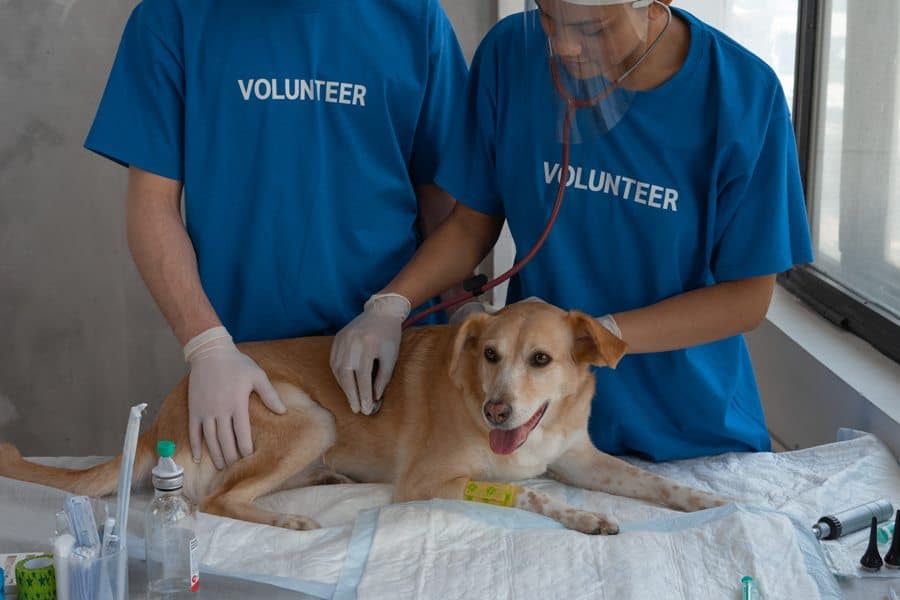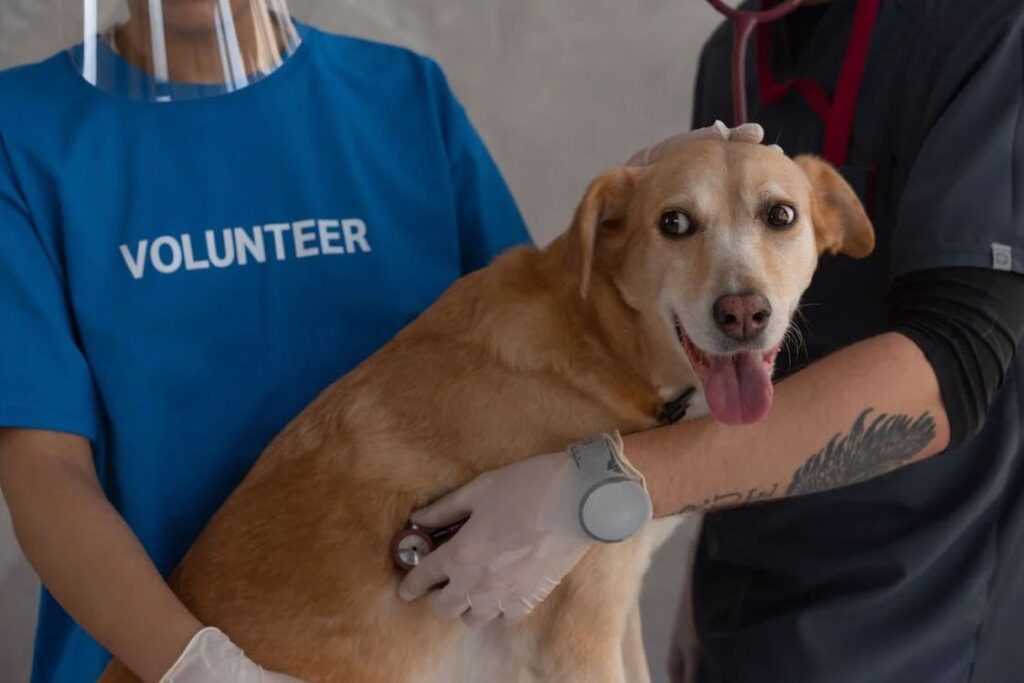Your dog deserves to live healthily, and pet owners must secure dog vaccinations to prevent diseases. While immunizing your pets is essential, you should be cautious about what happens if a dog gets vaccinated twice. We’re going to help you understand dog vaccinations and how to avoid over-vaccinating.
Contents
Allergic Reactions
Studies show that young adult small-breed dogs with multiple vaccines per vet visit were at the greatest risk of vaccine reaction within three days of vaccination. However, this isn’t true for multivalent vaccines, including parvovirus, parainfluenza, or bordetella for kennel cough.
While allergic reactions may disappear in a day or two, some dog vaccines can result in more severe problems. You must bring your dogs back to the veterinarian if there are allergic reactions for a prolonged period.
Reactions at the Injection Site
In general, dogs should only receive one vaccine at a time. As a dog owner, you should look for redness, swelling, pain, or irritation in the injection area. Abscess or collection of pus may also form at the site.
Anaphylaxis
Although rare, anaphylaxis can be life-threatening, resulting in cardiac or respiratory failure, shock, and even death.
Breathing Problems
Breathing issues may occur if your dog has a vaccine reaction. Intranasal vaccinations may cause sneezing, mild cough, or discharge from the nose.
Loss of Appetite
A decreased appetite may happen one or two days after vaccinations. It may also come alongside mild fever and depression.
Heightened Feelings and Fears
Most dogs are fearless and inquisitive. However, frequent vaccination can sometimes result in suspicions and irrational fears. For example, your pet may experience a great desire or extreme fear of their immediate environment, food, or even the people they normally interact with.
Some may even feel extremely fearful of sounds or the weather. Aside from that, you may notice your pet whining a few hours after the vaccination. Be careful not to apply pressure to the vaccination site lump. Keep your dog from playing with another pet for a few hours.
What Are the Core Vaccines for Dogs?
Core vaccines can protect your dog from fatal diseases as they have antigens that imitate a disease organism. As a disease attacks your pet’s immune system, your dog’s body will detect and combat it. From there, your pet’s bodily defense will generate antibodies to fight off disease organisms in the future.
Vaccines help your pet’s immune system in defending the body. These are the types of core vaccines administered to most dogs.
- Canine Parvovirus Vaccination: Canine parvovirus is an extremely contagious disease that spreads through exposure to the waste of infected dogs. The canine parvovirus vaccination may include vaccines for distemper, hepatitis, leptospira, parainfluenza, and parvovirus.
- Canine Adenovirus Vaccine: Canine hepatitis may come from canine adenovirus type 1. Dogs with this illness can cause liver damage and death. Get your dog vaccinated with canine adenovirus-1 and canine adenovirus-2 vaccines to make them immune to hepatitis and adenovirus.
- Canine Distemper Vaccination: Canine distemper is a highly contagious disease that spreads through the air. You can protect your dog’s respiratory, nervous, and gastrointestinal systems if you get your dog vaccinated with the canine distemper vaccine.
- Rabies Vaccination: Rabies can transmit through bites and scratches. Securing rabies immunization can prevent paralytic rabies that may result in a lack of coordination, lethargy, or paralysis. Most vet clinics administer rabies vaccination at the standard three-year interval.
What Are the Non-Core Vaccinations for Dogs?
Non-core vaccination typically caters to local viruses, like canine coronavirus, so they aren’t mandatory. For instance, the American Animal Hospital Association (AAHA) no longer endorses the Giardia vaccine to combat germs that cause diarrheal disease. Meanwhile, canine coronavirus doesn’t spread to humans.
- Bordetella bronchiseptica vaccine: Kennel cough can easily spread from an infected dog. Bordetella or kennel cough vaccine is ideal for pets exposed to boarding or social environments.
- Leptospirosis vaccine: Your pet may contract leptospirosis due to contaminated urine, water, and soil exposure. Vaccinating your dog twice against leptospirosis is usually optional since this is a non-core vaccine. You may consider this vaccine if your pet frequents boarding kennels or dog daycares in Temecula.
- Parainfluenza vaccine: Canine influenza is another contagious respiratory virus. Having me administer the parainfluenza vaccine to your pet can save your dog from viral lung infections.
- Lyme disease vaccine: Borrelia burgdorferi is a fatal illness transmitted through deer ticks. The Lyme disease vaccine can be helpful for pet owners who live in tick-infested areas.
While your dog won’t have to receive non-core vaccinations immediately, it’s best to consult our vet about potential viruses spreading around the area. This way, we can take a titer test and recommend the appropriate vaccine for the situation or any mild disease.
Educate Yourself About Dog Vaccination Basics
Among the best ways to avoid over-vaccinating your pet is to learn more about the basics of dog immunization, mainly the proper vaccination intervals. The vaccine’s efficacy may also depend on your dog’s age, weight, lifestyle, and medical condition.
- Core vaccines: Your dogs should receive annual core vaccinations between eight to 16 weeks of age to protect them from serious, life-threatening diseases. This includes canine parvovirus, canine distemper, and canine adenovirus. The rabies vaccine is also core, although dogs can only have it once at age 12 to 16 weeks.
- Non-core vaccinations: Non-core vaccines apply to dogs whose local environment, lifestyle, and geographical location put them at risk of contracting certain infections. These vaccines are parainfluenza, bordetella, Borrelia burgdorferi, and leptospirosis.
Don’t fret in case you miss the second dose of your dog’s vaccine. Make sure not to leave a gap of over six weeks between the vaccines and reschedule the vaccine session immediately.
Where Can I Get My Pet Vaccinated?
Getting your dog or cat vaccinated is not only crucial for their health yet also for public health. Initial vaccination and booster shots, also called booster shots, are essential to ensure your pet receives the necessary protection. Yet where can you get them?
The answer is simple: visit a licensed veterinarian at a veterinary office. Don’t fall for cheap, unlicensed providers that offer to vaccinate your pet in their backyard.
Your dog or cat deserves the best care, and the only way to guarantee that is by going to a professional. With new vaccines and updated guidelines, some vaccinations are now recommended every three years, while others are still required annually.
When Should My Pet Receive Its First Rabies Vaccination?
Your pet should receive its first rabies immunization as early as 12 weeks old, with a second rabies vaccination given within one year. After that, booster shots are typically given every one to three years, depending on the type of vaccine used and local regulations.
After My Pet Gets Its Second Rabies Shot, When Is the Next Booster Shot Due?
The answer depends on the type of vaccine used and local regulations. In general, booster shots for rabies are typically given every one to three years after the initial vaccination and second rabies vaccination.
What Proof Will I Have That My Pet Received Its Rabies Shot?
You’ll need a vaccination certificate to show that your dog or cat has been vaccinated for rabies. After your pet receives its rabies shot, the licensed veterinarian at the veterinary office will provide you with a vaccination certificate.
This document is important to keep in a safe place and bring to future veterinary appointments. It shows proof of your pet’s initial vaccination, second rabies vaccination, and booster shots, as well as the date they are due for their next rabies shot.
What if My Pet Needs to Be Taken to the Veterinarian?
Take them to a licensed veterinarian at a veterinary office. A professional veterinarian will be able to properly diagnose and treat any health concerns your dog or cat may have, and ensure they receive the necessary vaccinations and booster shots, including the rabies vaccine.
Keep a Record of Your Dog’s Vaccination History
You can bring your dog’s vaccination history. In this way, we can better understand your dog’s health. Likewise, we can see changes in a pet’s health.
You should also keep a log of the dates and duration of the side effects of double vaccination. For example, record when and how long your pet loses appetite after the first shot. This way, you can easily answer the vet’s questions regarding symptoms after the vaccination.
We may adjust vaccination schedules depending on the dog’s medical history, test results, injuries, surgeries, and medications. Thus, keeping the doctor’s card handy is crucial to ensure we get all the information and proceed according to the pet’s needs.
Create a Pet Vaccination Schedule Chart
Creating a vaccination schedule chart will help you check schedules, particularly if several pets need immunization. It can be confusing at times since vaccination schedules include periodic adult boosters.
This guarantees you will attend vaccination dates and be on time for the appointment. Likewise, this ensures you’re bringing the right dog and vaccination cards.
Be Open to Discussions About Dog Vaccines
Discuss the dog’s health issues or behavioral changes after vaccination, especially if you notice a problem in the immune system or difficulty breathing. Consider vital details like age, health status, and lifestyle before deciding. Such information can help us provide proper vaccinations or treatments for your pets, mainly if this is your first time caring for a dog.
Know the Cost of Dog Vaccines
Know the cost of immunization to avoid making bad decisions due to high prices. However, be cautious about vaccine providers offering cheap and unnecessary dog vaccinations. Don’t take vaccine recommendations blindly. This is why I fully explain the purpose and benefits of each vaccine.
Related Questions
Does My Dog Need Booster Shots?
Guidelines from the American Animal Hospital Association show that commercially available vaccines can provide a protective immune response for up to five years. However, dogs require regular booster injections to reinforce their immunity from initial vaccinations as they grow old.
How Long Can You Leave Between Dog Vaccinations?
The waiting period between each vaccine should depend on the pet’s age. Vaccination usually happens three times in six months if it’s a puppy. After that, it could be yearly or once every three years.
When Should My Pet Receive Its Second Rabies Vaccination?
Your pet should receive its second rabies vaccination within one year of its initial vaccination. After that, booster shots are typically given every one to three years, depending on the type of vaccine used and local regulations.



